A Comprehensive Report on Theories, Principles & Models in Education
VerifiedAdded on 2023/06/18
|20
|7323
|474
Report
AI Summary
This report provides a detailed analysis of theories, principles, and models in education and training, covering learning processes, communication, assessment, curriculum development, and reflection & evaluation. It examines various learning theories such as behaviorism, cognitivism, and constructivism, and explores models like VAK and Kolb. The report also discusses the importance of identifying individual learning preferences for inclusive teaching practices. Furthermore, it analyzes communication models and principles, emphasizing their application in learning and teaching. The assessment section delves into theories and models of assessment and their practical application. The report also addresses curriculum development theories and models, alongside theories of reflection and evaluation, highlighting their importance in reviewing teaching practices. The document concludes by emphasizing the significance of these theories and models in enhancing the overall educational experience.
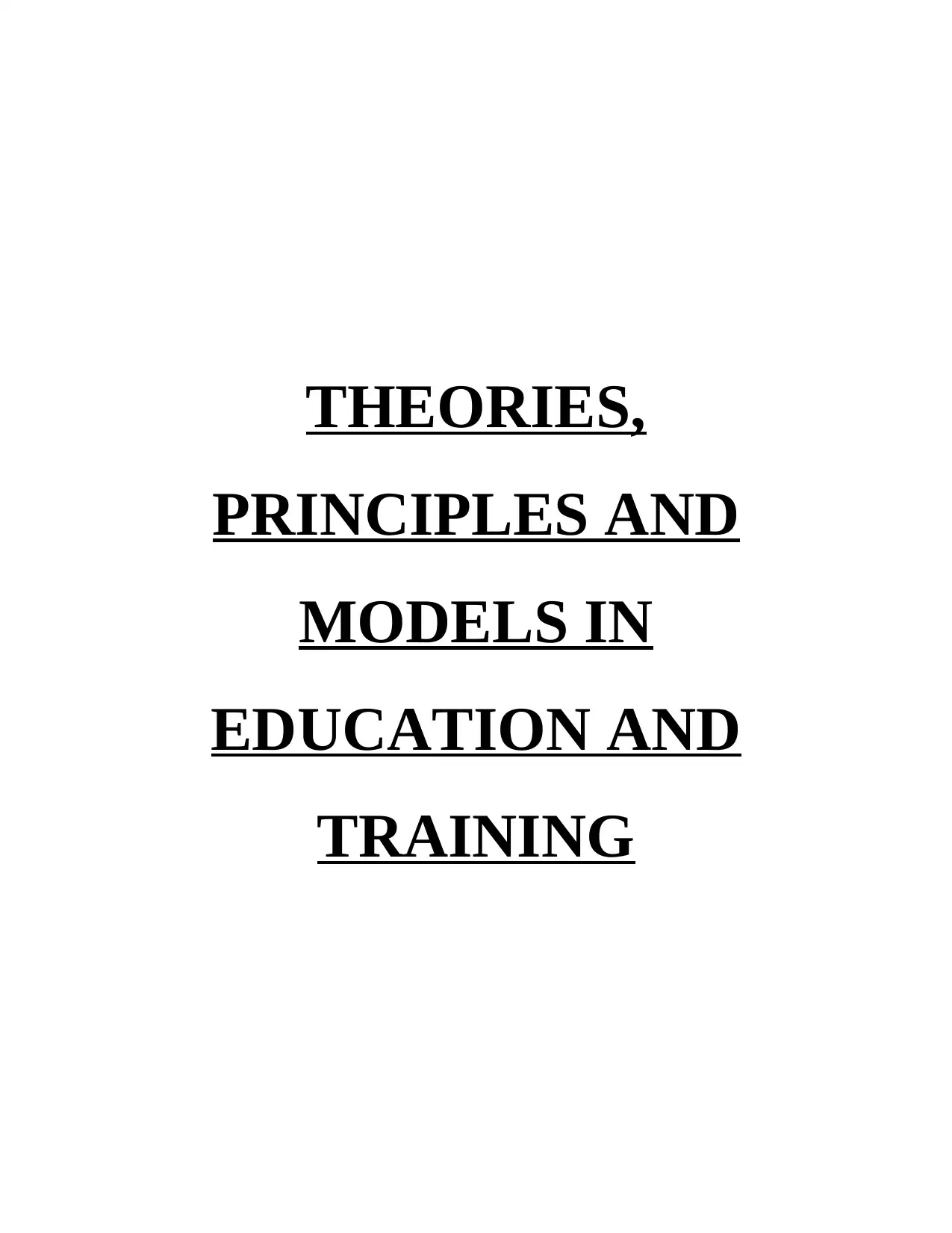
THEORIES,
PRINCIPLES AND
MODELS IN
EDUCATION AND
TRAINING
PRINCIPLES AND
MODELS IN
EDUCATION AND
TRAINING
Paraphrase This Document
Need a fresh take? Get an instant paraphrase of this document with our AI Paraphraser
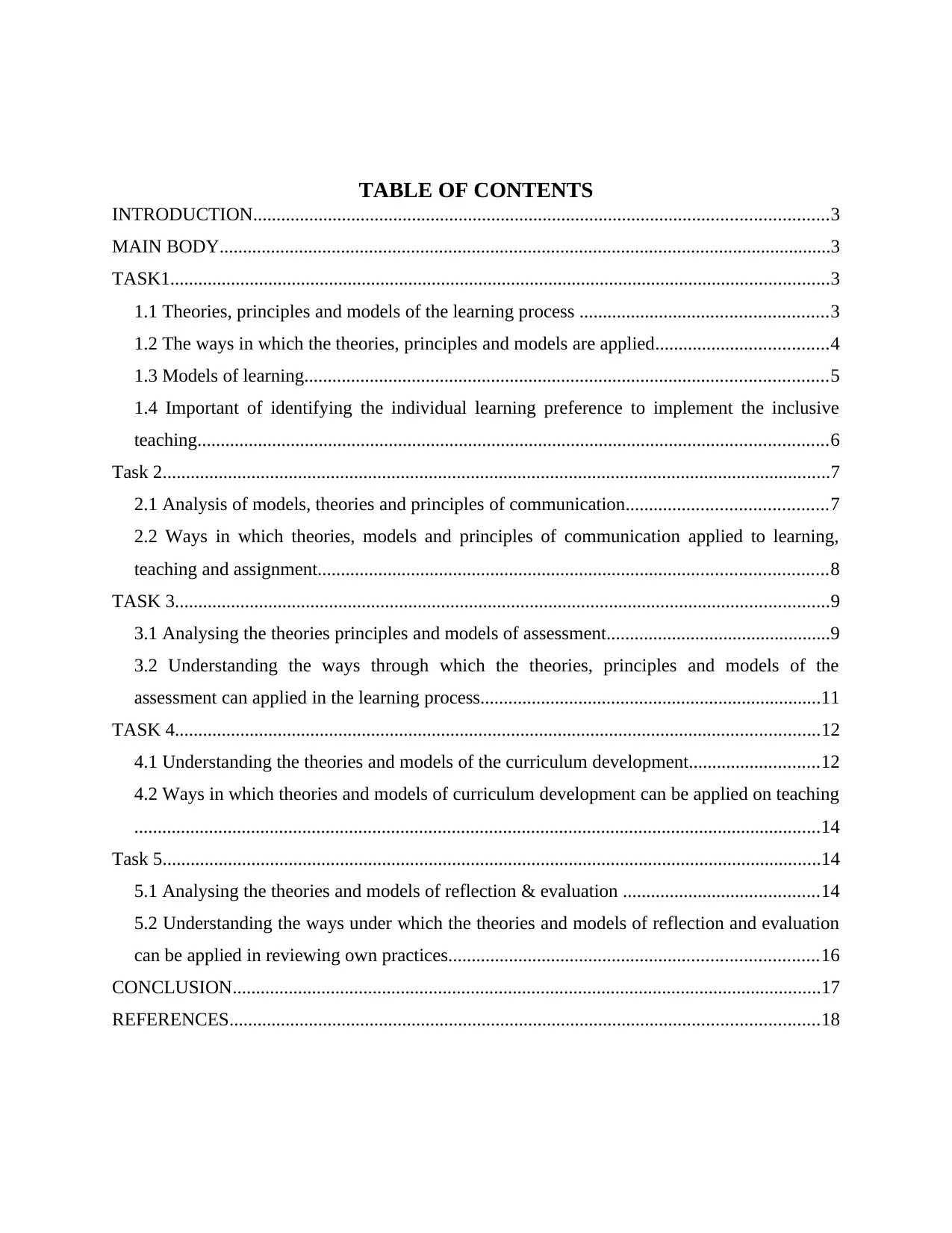
TABLE OF CONTENTS
INTRODUCTION...........................................................................................................................3
MAIN BODY...................................................................................................................................3
TASK1.............................................................................................................................................3
1.1 Theories, principles and models of the learning process .....................................................3
1.2 The ways in which the theories, principles and models are applied.....................................4
1.3 Models of learning................................................................................................................5
1.4 Important of identifying the individual learning preference to implement the inclusive
teaching.......................................................................................................................................6
Task 2...............................................................................................................................................7
2.1 Analysis of models, theories and principles of communication...........................................7
2.2 Ways in which theories, models and principles of communication applied to learning,
teaching and assignment.............................................................................................................8
TASK 3............................................................................................................................................9
3.1 Analysing the theories principles and models of assessment................................................9
3.2 Understanding the ways through which the theories, principles and models of the
assessment can applied in the learning process.........................................................................11
TASK 4..........................................................................................................................................12
4.1 Understanding the theories and models of the curriculum development............................12
4.2 Ways in which theories and models of curriculum development can be applied on teaching
...................................................................................................................................................14
Task 5.............................................................................................................................................14
5.1 Analysing the theories and models of reflection & evaluation ..........................................14
5.2 Understanding the ways under which the theories and models of reflection and evaluation
can be applied in reviewing own practices...............................................................................16
CONCLUSION..............................................................................................................................17
REFERENCES..............................................................................................................................18
INTRODUCTION...........................................................................................................................3
MAIN BODY...................................................................................................................................3
TASK1.............................................................................................................................................3
1.1 Theories, principles and models of the learning process .....................................................3
1.2 The ways in which the theories, principles and models are applied.....................................4
1.3 Models of learning................................................................................................................5
1.4 Important of identifying the individual learning preference to implement the inclusive
teaching.......................................................................................................................................6
Task 2...............................................................................................................................................7
2.1 Analysis of models, theories and principles of communication...........................................7
2.2 Ways in which theories, models and principles of communication applied to learning,
teaching and assignment.............................................................................................................8
TASK 3............................................................................................................................................9
3.1 Analysing the theories principles and models of assessment................................................9
3.2 Understanding the ways through which the theories, principles and models of the
assessment can applied in the learning process.........................................................................11
TASK 4..........................................................................................................................................12
4.1 Understanding the theories and models of the curriculum development............................12
4.2 Ways in which theories and models of curriculum development can be applied on teaching
...................................................................................................................................................14
Task 5.............................................................................................................................................14
5.1 Analysing the theories and models of reflection & evaluation ..........................................14
5.2 Understanding the ways under which the theories and models of reflection and evaluation
can be applied in reviewing own practices...............................................................................16
CONCLUSION..............................................................................................................................17
REFERENCES..............................................................................................................................18
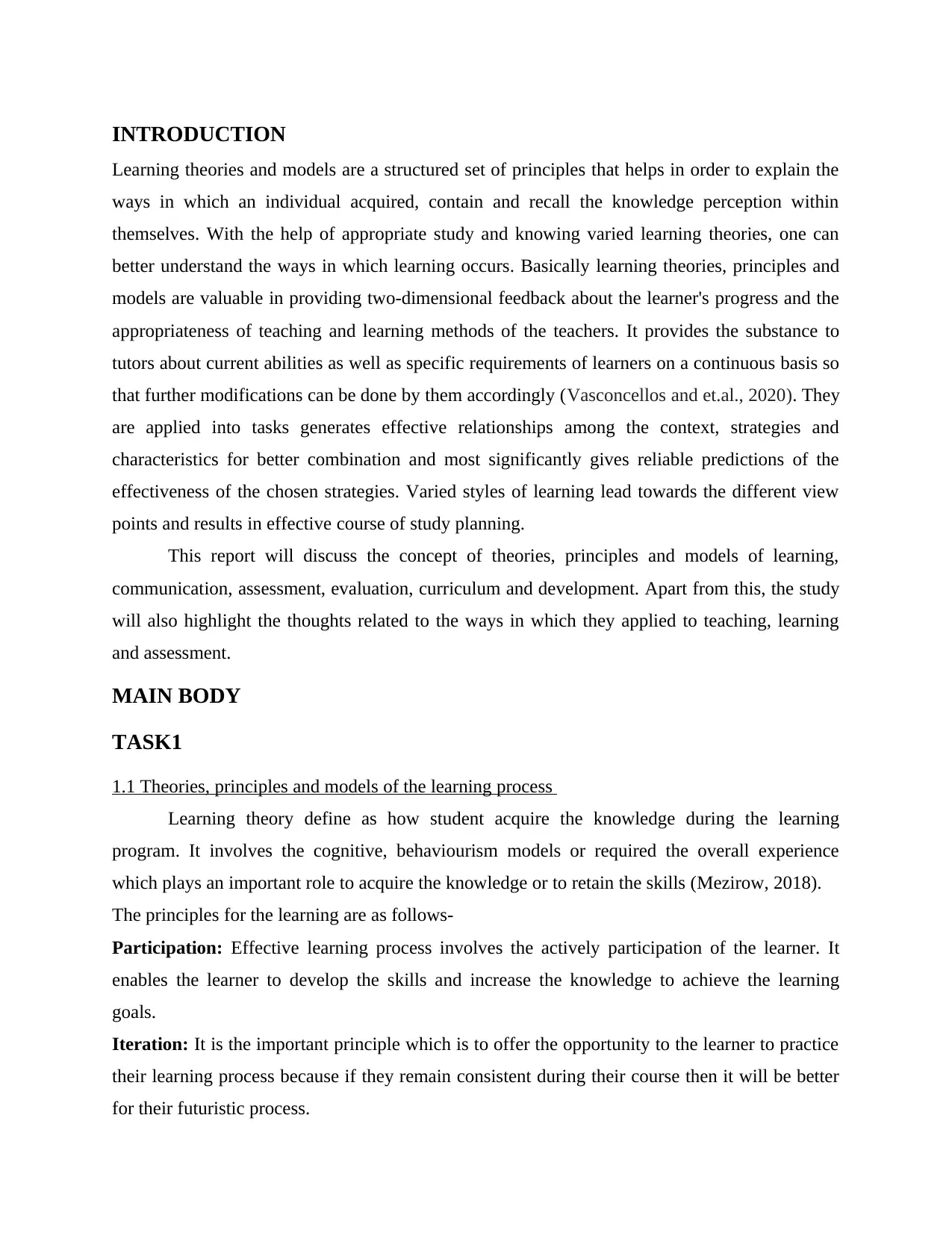
INTRODUCTION
Learning theories and models are a structured set of principles that helps in order to explain the
ways in which an individual acquired, contain and recall the knowledge perception within
themselves. With the help of appropriate study and knowing varied learning theories, one can
better understand the ways in which learning occurs. Basically learning theories, principles and
models are valuable in providing two-dimensional feedback about the learner's progress and the
appropriateness of teaching and learning methods of the teachers. It provides the substance to
tutors about current abilities as well as specific requirements of learners on a continuous basis so
that further modifications can be done by them accordingly (Vasconcellos and et.al., 2020). They
are applied into tasks generates effective relationships among the context, strategies and
characteristics for better combination and most significantly gives reliable predictions of the
effectiveness of the chosen strategies. Varied styles of learning lead towards the different view
points and results in effective course of study planning.
This report will discuss the concept of theories, principles and models of learning,
communication, assessment, evaluation, curriculum and development. Apart from this, the study
will also highlight the thoughts related to the ways in which they applied to teaching, learning
and assessment.
MAIN BODY
TASK1
1.1 Theories, principles and models of the learning process
Learning theory define as how student acquire the knowledge during the learning
program. It involves the cognitive, behaviourism models or required the overall experience
which plays an important role to acquire the knowledge or to retain the skills (Mezirow, 2018).
The principles for the learning are as follows-
Participation: Effective learning process involves the actively participation of the learner. It
enables the learner to develop the skills and increase the knowledge to achieve the learning
goals.
Iteration: It is the important principle which is to offer the opportunity to the learner to practice
their learning process because if they remain consistent during their course then it will be better
for their futuristic process.
Learning theories and models are a structured set of principles that helps in order to explain the
ways in which an individual acquired, contain and recall the knowledge perception within
themselves. With the help of appropriate study and knowing varied learning theories, one can
better understand the ways in which learning occurs. Basically learning theories, principles and
models are valuable in providing two-dimensional feedback about the learner's progress and the
appropriateness of teaching and learning methods of the teachers. It provides the substance to
tutors about current abilities as well as specific requirements of learners on a continuous basis so
that further modifications can be done by them accordingly (Vasconcellos and et.al., 2020). They
are applied into tasks generates effective relationships among the context, strategies and
characteristics for better combination and most significantly gives reliable predictions of the
effectiveness of the chosen strategies. Varied styles of learning lead towards the different view
points and results in effective course of study planning.
This report will discuss the concept of theories, principles and models of learning,
communication, assessment, evaluation, curriculum and development. Apart from this, the study
will also highlight the thoughts related to the ways in which they applied to teaching, learning
and assessment.
MAIN BODY
TASK1
1.1 Theories, principles and models of the learning process
Learning theory define as how student acquire the knowledge during the learning
program. It involves the cognitive, behaviourism models or required the overall experience
which plays an important role to acquire the knowledge or to retain the skills (Mezirow, 2018).
The principles for the learning are as follows-
Participation: Effective learning process involves the actively participation of the learner. It
enables the learner to develop the skills and increase the knowledge to achieve the learning
goals.
Iteration: It is the important principle which is to offer the opportunity to the learner to practice
their learning process because if they remain consistent during their course then it will be better
for their futuristic process.
⊘ This is a preview!⊘
Do you want full access?
Subscribe today to unlock all pages.

Trusted by 1+ million students worldwide
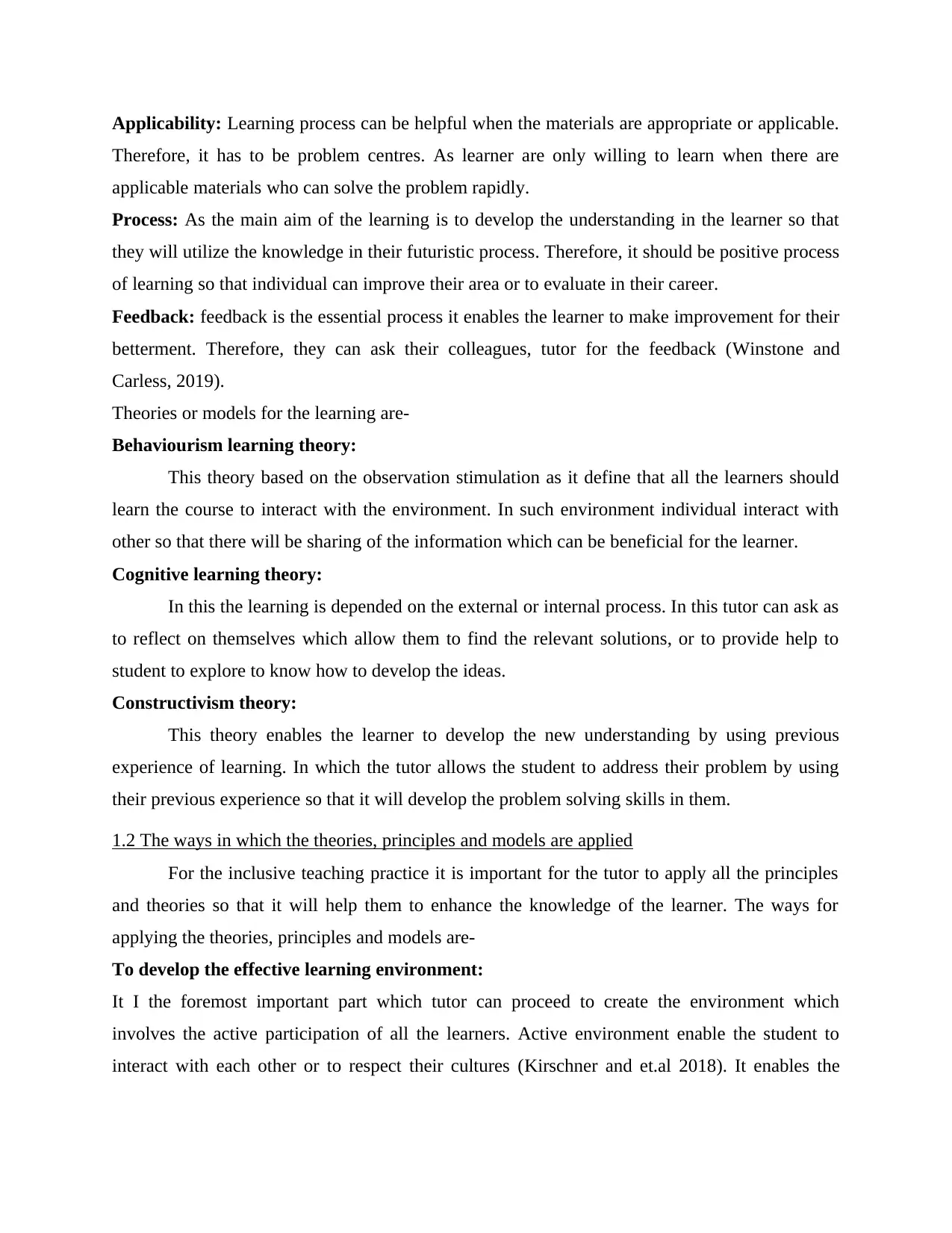
Applicability: Learning process can be helpful when the materials are appropriate or applicable.
Therefore, it has to be problem centres. As learner are only willing to learn when there are
applicable materials who can solve the problem rapidly.
Process: As the main aim of the learning is to develop the understanding in the learner so that
they will utilize the knowledge in their futuristic process. Therefore, it should be positive process
of learning so that individual can improve their area or to evaluate in their career.
Feedback: feedback is the essential process it enables the learner to make improvement for their
betterment. Therefore, they can ask their colleagues, tutor for the feedback (Winstone and
Carless, 2019).
Theories or models for the learning are-
Behaviourism learning theory:
This theory based on the observation stimulation as it define that all the learners should
learn the course to interact with the environment. In such environment individual interact with
other so that there will be sharing of the information which can be beneficial for the learner.
Cognitive learning theory:
In this the learning is depended on the external or internal process. In this tutor can ask as
to reflect on themselves which allow them to find the relevant solutions, or to provide help to
student to explore to know how to develop the ideas.
Constructivism theory:
This theory enables the learner to develop the new understanding by using previous
experience of learning. In which the tutor allows the student to address their problem by using
their previous experience so that it will develop the problem solving skills in them.
1.2 The ways in which the theories, principles and models are applied
For the inclusive teaching practice it is important for the tutor to apply all the principles
and theories so that it will help them to enhance the knowledge of the learner. The ways for
applying the theories, principles and models are-
To develop the effective learning environment:
It I the foremost important part which tutor can proceed to create the environment which
involves the active participation of all the learners. Active environment enable the student to
interact with each other or to respect their cultures (Kirschner and et.al 2018). It enables the
Therefore, it has to be problem centres. As learner are only willing to learn when there are
applicable materials who can solve the problem rapidly.
Process: As the main aim of the learning is to develop the understanding in the learner so that
they will utilize the knowledge in their futuristic process. Therefore, it should be positive process
of learning so that individual can improve their area or to evaluate in their career.
Feedback: feedback is the essential process it enables the learner to make improvement for their
betterment. Therefore, they can ask their colleagues, tutor for the feedback (Winstone and
Carless, 2019).
Theories or models for the learning are-
Behaviourism learning theory:
This theory based on the observation stimulation as it define that all the learners should
learn the course to interact with the environment. In such environment individual interact with
other so that there will be sharing of the information which can be beneficial for the learner.
Cognitive learning theory:
In this the learning is depended on the external or internal process. In this tutor can ask as
to reflect on themselves which allow them to find the relevant solutions, or to provide help to
student to explore to know how to develop the ideas.
Constructivism theory:
This theory enables the learner to develop the new understanding by using previous
experience of learning. In which the tutor allows the student to address their problem by using
their previous experience so that it will develop the problem solving skills in them.
1.2 The ways in which the theories, principles and models are applied
For the inclusive teaching practice it is important for the tutor to apply all the principles
and theories so that it will help them to enhance the knowledge of the learner. The ways for
applying the theories, principles and models are-
To develop the effective learning environment:
It I the foremost important part which tutor can proceed to create the environment which
involves the active participation of all the learners. Active environment enable the student to
interact with each other or to respect their cultures (Kirschner and et.al 2018). It enables the
Paraphrase This Document
Need a fresh take? Get an instant paraphrase of this document with our AI Paraphraser
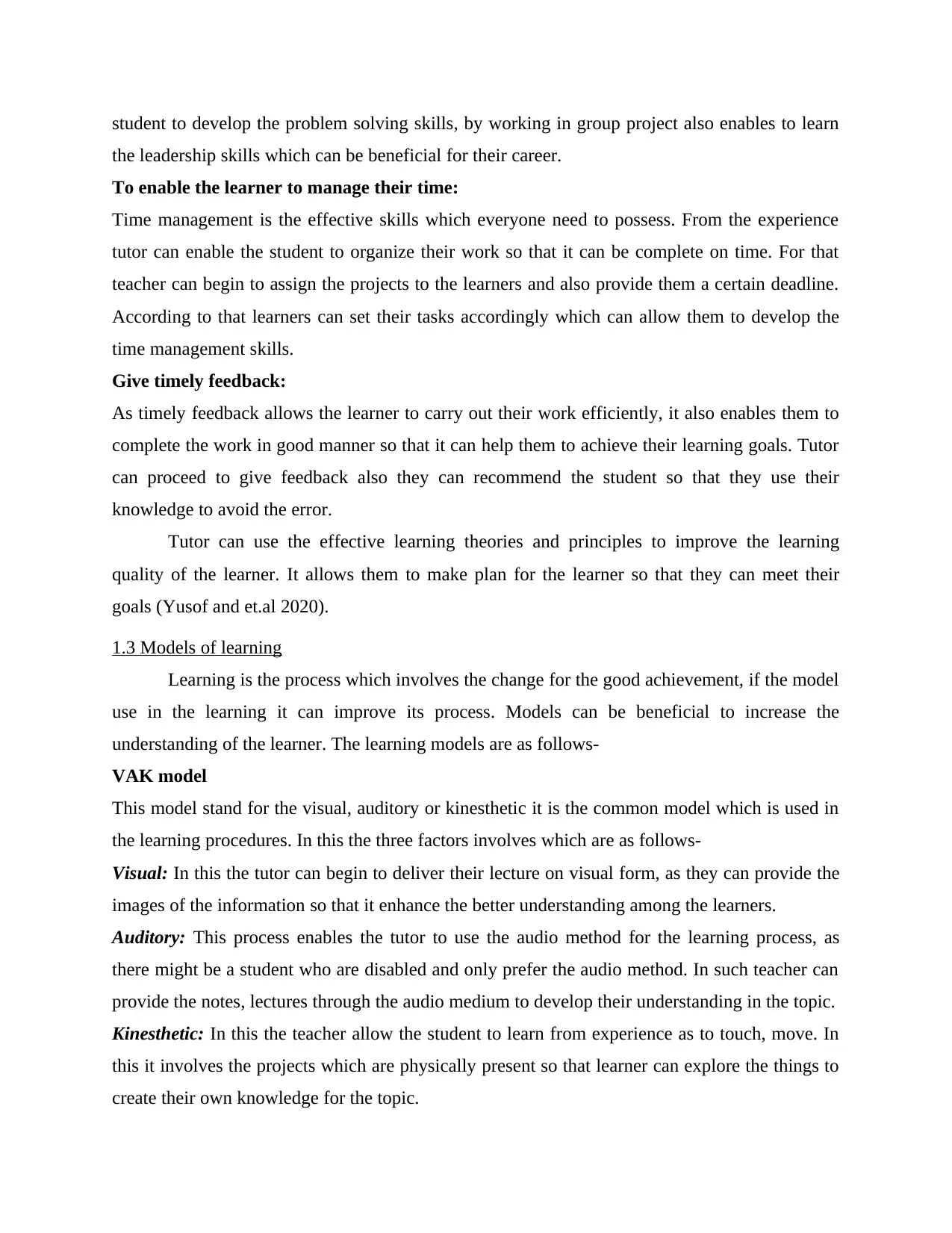
student to develop the problem solving skills, by working in group project also enables to learn
the leadership skills which can be beneficial for their career.
To enable the learner to manage their time:
Time management is the effective skills which everyone need to possess. From the experience
tutor can enable the student to organize their work so that it can be complete on time. For that
teacher can begin to assign the projects to the learners and also provide them a certain deadline.
According to that learners can set their tasks accordingly which can allow them to develop the
time management skills.
Give timely feedback:
As timely feedback allows the learner to carry out their work efficiently, it also enables them to
complete the work in good manner so that it can help them to achieve their learning goals. Tutor
can proceed to give feedback also they can recommend the student so that they use their
knowledge to avoid the error.
Tutor can use the effective learning theories and principles to improve the learning
quality of the learner. It allows them to make plan for the learner so that they can meet their
goals (Yusof and et.al 2020).
1.3 Models of learning
Learning is the process which involves the change for the good achievement, if the model
use in the learning it can improve its process. Models can be beneficial to increase the
understanding of the learner. The learning models are as follows-
VAK model
This model stand for the visual, auditory or kinesthetic it is the common model which is used in
the learning procedures. In this the three factors involves which are as follows-
Visual: In this the tutor can begin to deliver their lecture on visual form, as they can provide the
images of the information so that it enhance the better understanding among the learners.
Auditory: This process enables the tutor to use the audio method for the learning process, as
there might be a student who are disabled and only prefer the audio method. In such teacher can
provide the notes, lectures through the audio medium to develop their understanding in the topic.
Kinesthetic: In this the teacher allow the student to learn from experience as to touch, move. In
this it involves the projects which are physically present so that learner can explore the things to
create their own knowledge for the topic.
the leadership skills which can be beneficial for their career.
To enable the learner to manage their time:
Time management is the effective skills which everyone need to possess. From the experience
tutor can enable the student to organize their work so that it can be complete on time. For that
teacher can begin to assign the projects to the learners and also provide them a certain deadline.
According to that learners can set their tasks accordingly which can allow them to develop the
time management skills.
Give timely feedback:
As timely feedback allows the learner to carry out their work efficiently, it also enables them to
complete the work in good manner so that it can help them to achieve their learning goals. Tutor
can proceed to give feedback also they can recommend the student so that they use their
knowledge to avoid the error.
Tutor can use the effective learning theories and principles to improve the learning
quality of the learner. It allows them to make plan for the learner so that they can meet their
goals (Yusof and et.al 2020).
1.3 Models of learning
Learning is the process which involves the change for the good achievement, if the model
use in the learning it can improve its process. Models can be beneficial to increase the
understanding of the learner. The learning models are as follows-
VAK model
This model stand for the visual, auditory or kinesthetic it is the common model which is used in
the learning procedures. In this the three factors involves which are as follows-
Visual: In this the tutor can begin to deliver their lecture on visual form, as they can provide the
images of the information so that it enhance the better understanding among the learners.
Auditory: This process enables the tutor to use the audio method for the learning process, as
there might be a student who are disabled and only prefer the audio method. In such teacher can
provide the notes, lectures through the audio medium to develop their understanding in the topic.
Kinesthetic: In this the teacher allow the student to learn from experience as to touch, move. In
this it involves the projects which are physically present so that learner can explore the things to
create their own knowledge for the topic.
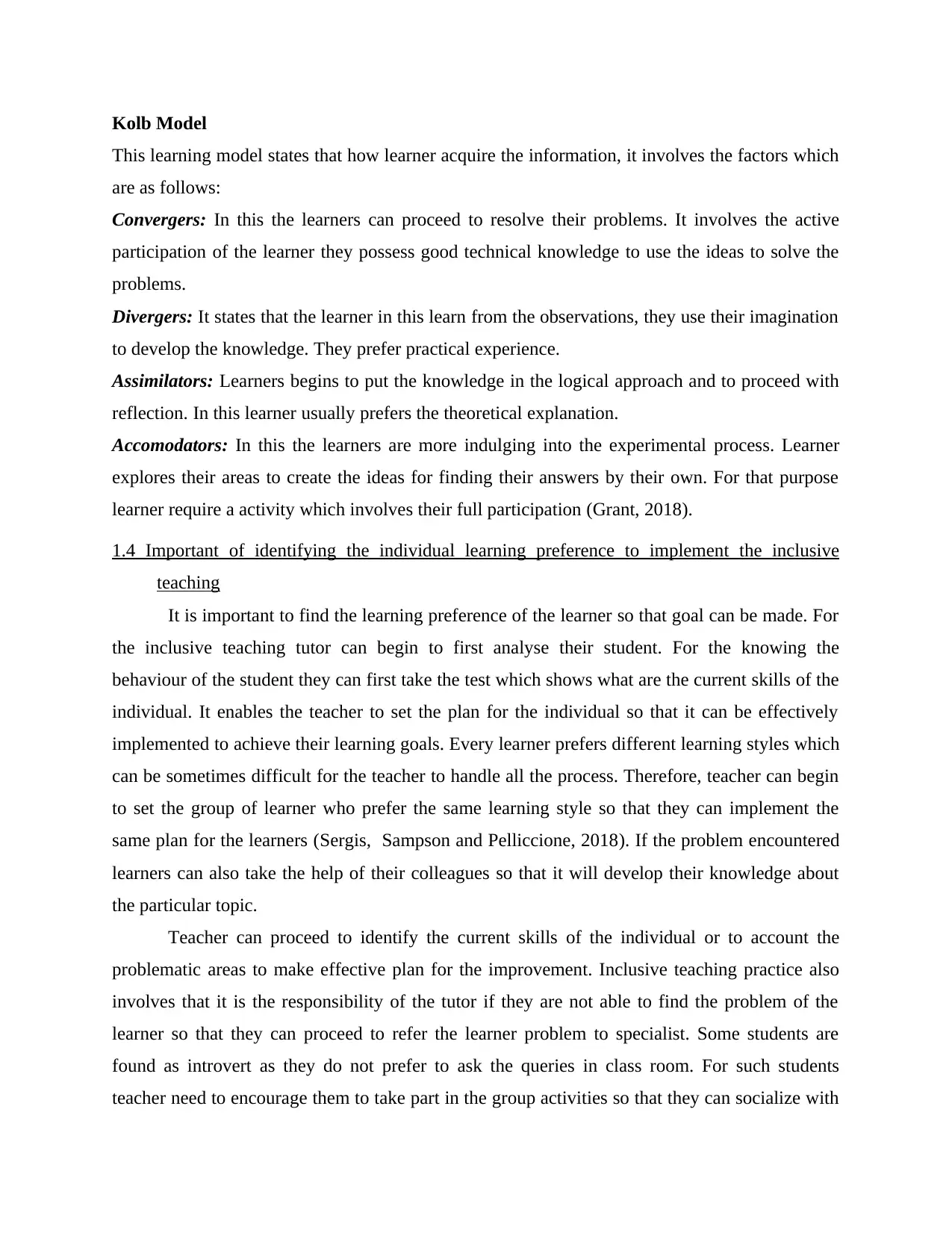
Kolb Model
This learning model states that how learner acquire the information, it involves the factors which
are as follows:
Convergers: In this the learners can proceed to resolve their problems. It involves the active
participation of the learner they possess good technical knowledge to use the ideas to solve the
problems.
Divergers: It states that the learner in this learn from the observations, they use their imagination
to develop the knowledge. They prefer practical experience.
Assimilators: Learners begins to put the knowledge in the logical approach and to proceed with
reflection. In this learner usually prefers the theoretical explanation.
Accomodators: In this the learners are more indulging into the experimental process. Learner
explores their areas to create the ideas for finding their answers by their own. For that purpose
learner require a activity which involves their full participation (Grant, 2018).
1.4 Important of identifying the individual learning preference to implement the inclusive
teaching
It is important to find the learning preference of the learner so that goal can be made. For
the inclusive teaching tutor can begin to first analyse their student. For the knowing the
behaviour of the student they can first take the test which shows what are the current skills of the
individual. It enables the teacher to set the plan for the individual so that it can be effectively
implemented to achieve their learning goals. Every learner prefers different learning styles which
can be sometimes difficult for the teacher to handle all the process. Therefore, teacher can begin
to set the group of learner who prefer the same learning style so that they can implement the
same plan for the learners (Sergis, Sampson and Pelliccione, 2018). If the problem encountered
learners can also take the help of their colleagues so that it will develop their knowledge about
the particular topic.
Teacher can proceed to identify the current skills of the individual or to account the
problematic areas to make effective plan for the improvement. Inclusive teaching practice also
involves that it is the responsibility of the tutor if they are not able to find the problem of the
learner so that they can proceed to refer the learner problem to specialist. Some students are
found as introvert as they do not prefer to ask the queries in class room. For such students
teacher need to encourage them to take part in the group activities so that they can socialize with
This learning model states that how learner acquire the information, it involves the factors which
are as follows:
Convergers: In this the learners can proceed to resolve their problems. It involves the active
participation of the learner they possess good technical knowledge to use the ideas to solve the
problems.
Divergers: It states that the learner in this learn from the observations, they use their imagination
to develop the knowledge. They prefer practical experience.
Assimilators: Learners begins to put the knowledge in the logical approach and to proceed with
reflection. In this learner usually prefers the theoretical explanation.
Accomodators: In this the learners are more indulging into the experimental process. Learner
explores their areas to create the ideas for finding their answers by their own. For that purpose
learner require a activity which involves their full participation (Grant, 2018).
1.4 Important of identifying the individual learning preference to implement the inclusive
teaching
It is important to find the learning preference of the learner so that goal can be made. For
the inclusive teaching tutor can begin to first analyse their student. For the knowing the
behaviour of the student they can first take the test which shows what are the current skills of the
individual. It enables the teacher to set the plan for the individual so that it can be effectively
implemented to achieve their learning goals. Every learner prefers different learning styles which
can be sometimes difficult for the teacher to handle all the process. Therefore, teacher can begin
to set the group of learner who prefer the same learning style so that they can implement the
same plan for the learners (Sergis, Sampson and Pelliccione, 2018). If the problem encountered
learners can also take the help of their colleagues so that it will develop their knowledge about
the particular topic.
Teacher can proceed to identify the current skills of the individual or to account the
problematic areas to make effective plan for the improvement. Inclusive teaching practice also
involves that it is the responsibility of the tutor if they are not able to find the problem of the
learner so that they can proceed to refer the learner problem to specialist. Some students are
found as introvert as they do not prefer to ask the queries in class room. For such students
teacher need to encourage them to take part in the group activities so that they can socialize with
⊘ This is a preview!⊘
Do you want full access?
Subscribe today to unlock all pages.

Trusted by 1+ million students worldwide
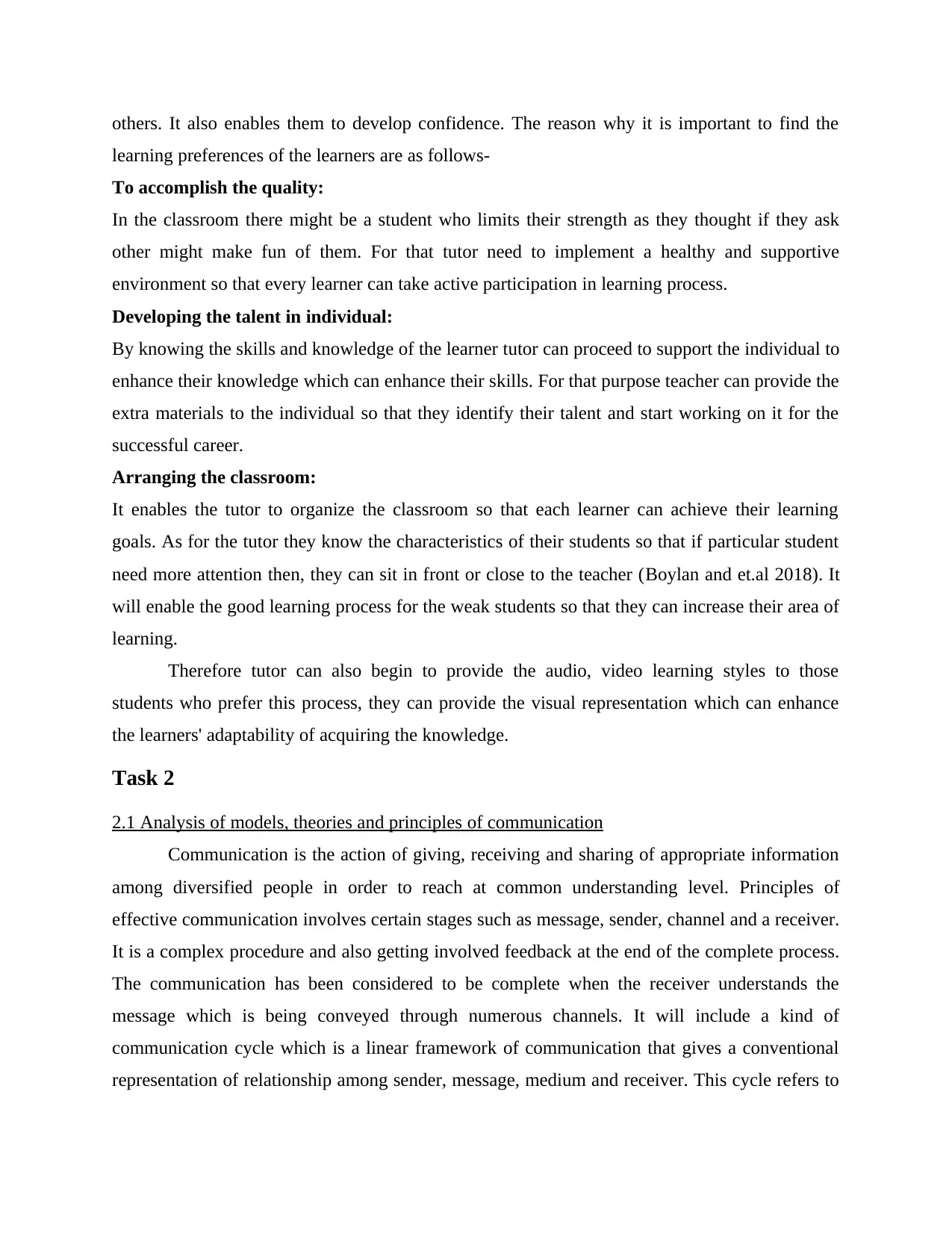
others. It also enables them to develop confidence. The reason why it is important to find the
learning preferences of the learners are as follows-
To accomplish the quality:
In the classroom there might be a student who limits their strength as they thought if they ask
other might make fun of them. For that tutor need to implement a healthy and supportive
environment so that every learner can take active participation in learning process.
Developing the talent in individual:
By knowing the skills and knowledge of the learner tutor can proceed to support the individual to
enhance their knowledge which can enhance their skills. For that purpose teacher can provide the
extra materials to the individual so that they identify their talent and start working on it for the
successful career.
Arranging the classroom:
It enables the tutor to organize the classroom so that each learner can achieve their learning
goals. As for the tutor they know the characteristics of their students so that if particular student
need more attention then, they can sit in front or close to the teacher (Boylan and et.al 2018). It
will enable the good learning process for the weak students so that they can increase their area of
learning.
Therefore tutor can also begin to provide the audio, video learning styles to those
students who prefer this process, they can provide the visual representation which can enhance
the learners' adaptability of acquiring the knowledge.
Task 2
2.1 Analysis of models, theories and principles of communication
Communication is the action of giving, receiving and sharing of appropriate information
among diversified people in order to reach at common understanding level. Principles of
effective communication involves certain stages such as message, sender, channel and a receiver.
It is a complex procedure and also getting involved feedback at the end of the complete process.
The communication has been considered to be complete when the receiver understands the
message which is being conveyed through numerous channels. It will include a kind of
communication cycle which is a linear framework of communication that gives a conventional
representation of relationship among sender, message, medium and receiver. This cycle refers to
learning preferences of the learners are as follows-
To accomplish the quality:
In the classroom there might be a student who limits their strength as they thought if they ask
other might make fun of them. For that tutor need to implement a healthy and supportive
environment so that every learner can take active participation in learning process.
Developing the talent in individual:
By knowing the skills and knowledge of the learner tutor can proceed to support the individual to
enhance their knowledge which can enhance their skills. For that purpose teacher can provide the
extra materials to the individual so that they identify their talent and start working on it for the
successful career.
Arranging the classroom:
It enables the tutor to organize the classroom so that each learner can achieve their learning
goals. As for the tutor they know the characteristics of their students so that if particular student
need more attention then, they can sit in front or close to the teacher (Boylan and et.al 2018). It
will enable the good learning process for the weak students so that they can increase their area of
learning.
Therefore tutor can also begin to provide the audio, video learning styles to those
students who prefer this process, they can provide the visual representation which can enhance
the learners' adaptability of acquiring the knowledge.
Task 2
2.1 Analysis of models, theories and principles of communication
Communication is the action of giving, receiving and sharing of appropriate information
among diversified people in order to reach at common understanding level. Principles of
effective communication involves certain stages such as message, sender, channel and a receiver.
It is a complex procedure and also getting involved feedback at the end of the complete process.
The communication has been considered to be complete when the receiver understands the
message which is being conveyed through numerous channels. It will include a kind of
communication cycle which is a linear framework of communication that gives a conventional
representation of relationship among sender, message, medium and receiver. This cycle refers to
Paraphrase This Document
Need a fresh take? Get an instant paraphrase of this document with our AI Paraphraser
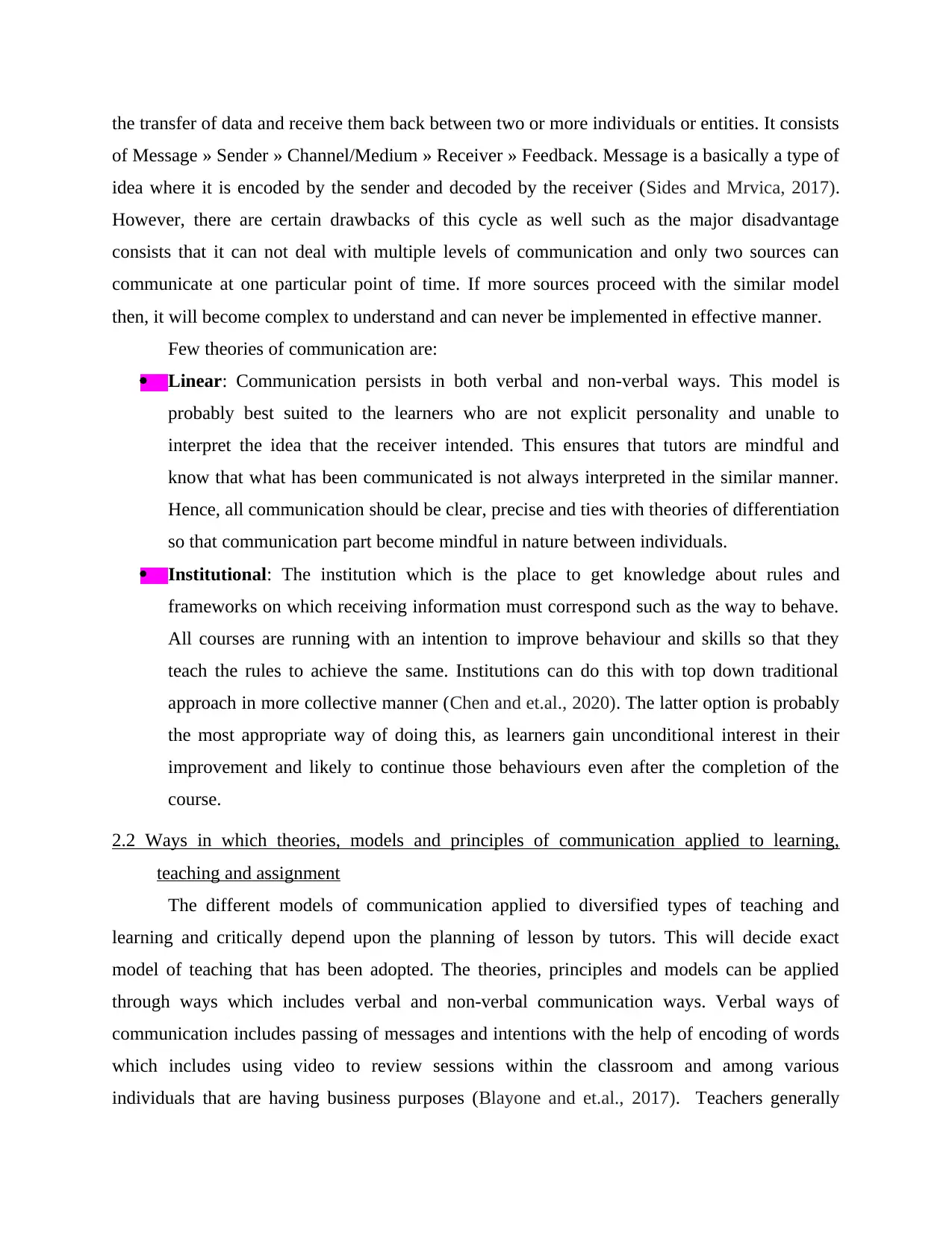
the transfer of data and receive them back between two or more individuals or entities. It consists
of Message » Sender » Channel/Medium » Receiver » Feedback. Message is a basically a type of
idea where it is encoded by the sender and decoded by the receiver (Sides and Mrvica, 2017).
However, there are certain drawbacks of this cycle as well such as the major disadvantage
consists that it can not deal with multiple levels of communication and only two sources can
communicate at one particular point of time. If more sources proceed with the similar model
then, it will become complex to understand and can never be implemented in effective manner.
Few theories of communication are:
Linear: Communication persists in both verbal and non-verbal ways. This model is
probably best suited to the learners who are not explicit personality and unable to
interpret the idea that the receiver intended. This ensures that tutors are mindful and
know that what has been communicated is not always interpreted in the similar manner.
Hence, all communication should be clear, precise and ties with theories of differentiation
so that communication part become mindful in nature between individuals.
Institutional: The institution which is the place to get knowledge about rules and
frameworks on which receiving information must correspond such as the way to behave.
All courses are running with an intention to improve behaviour and skills so that they
teach the rules to achieve the same. Institutions can do this with top down traditional
approach in more collective manner (Chen and et.al., 2020). The latter option is probably
the most appropriate way of doing this, as learners gain unconditional interest in their
improvement and likely to continue those behaviours even after the completion of the
course.
2.2 Ways in which theories, models and principles of communication applied to learning,
teaching and assignment
The different models of communication applied to diversified types of teaching and
learning and critically depend upon the planning of lesson by tutors. This will decide exact
model of teaching that has been adopted. The theories, principles and models can be applied
through ways which includes verbal and non-verbal communication ways. Verbal ways of
communication includes passing of messages and intentions with the help of encoding of words
which includes using video to review sessions within the classroom and among various
individuals that are having business purposes (Blayone and et.al., 2017). Teachers generally
of Message » Sender » Channel/Medium » Receiver » Feedback. Message is a basically a type of
idea where it is encoded by the sender and decoded by the receiver (Sides and Mrvica, 2017).
However, there are certain drawbacks of this cycle as well such as the major disadvantage
consists that it can not deal with multiple levels of communication and only two sources can
communicate at one particular point of time. If more sources proceed with the similar model
then, it will become complex to understand and can never be implemented in effective manner.
Few theories of communication are:
Linear: Communication persists in both verbal and non-verbal ways. This model is
probably best suited to the learners who are not explicit personality and unable to
interpret the idea that the receiver intended. This ensures that tutors are mindful and
know that what has been communicated is not always interpreted in the similar manner.
Hence, all communication should be clear, precise and ties with theories of differentiation
so that communication part become mindful in nature between individuals.
Institutional: The institution which is the place to get knowledge about rules and
frameworks on which receiving information must correspond such as the way to behave.
All courses are running with an intention to improve behaviour and skills so that they
teach the rules to achieve the same. Institutions can do this with top down traditional
approach in more collective manner (Chen and et.al., 2020). The latter option is probably
the most appropriate way of doing this, as learners gain unconditional interest in their
improvement and likely to continue those behaviours even after the completion of the
course.
2.2 Ways in which theories, models and principles of communication applied to learning,
teaching and assignment
The different models of communication applied to diversified types of teaching and
learning and critically depend upon the planning of lesson by tutors. This will decide exact
model of teaching that has been adopted. The theories, principles and models can be applied
through ways which includes verbal and non-verbal communication ways. Verbal ways of
communication includes passing of messages and intentions with the help of encoding of words
which includes using video to review sessions within the classroom and among various
individuals that are having business purposes (Blayone and et.al., 2017). Teachers generally
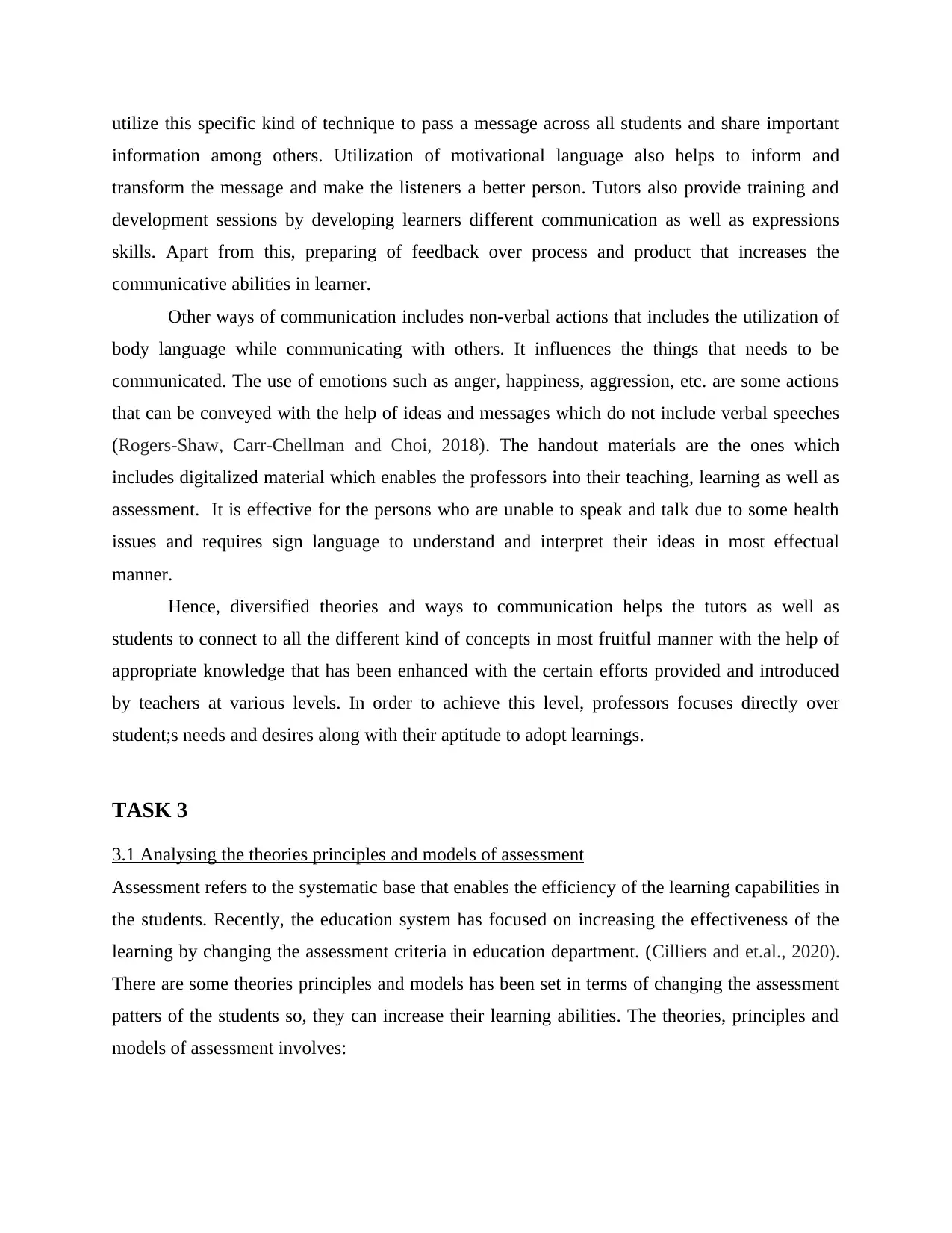
utilize this specific kind of technique to pass a message across all students and share important
information among others. Utilization of motivational language also helps to inform and
transform the message and make the listeners a better person. Tutors also provide training and
development sessions by developing learners different communication as well as expressions
skills. Apart from this, preparing of feedback over process and product that increases the
communicative abilities in learner.
Other ways of communication includes non-verbal actions that includes the utilization of
body language while communicating with others. It influences the things that needs to be
communicated. The use of emotions such as anger, happiness, aggression, etc. are some actions
that can be conveyed with the help of ideas and messages which do not include verbal speeches
(Rogers-Shaw, Carr-Chellman and Choi, 2018). The handout materials are the ones which
includes digitalized material which enables the professors into their teaching, learning as well as
assessment. It is effective for the persons who are unable to speak and talk due to some health
issues and requires sign language to understand and interpret their ideas in most effectual
manner.
Hence, diversified theories and ways to communication helps the tutors as well as
students to connect to all the different kind of concepts in most fruitful manner with the help of
appropriate knowledge that has been enhanced with the certain efforts provided and introduced
by teachers at various levels. In order to achieve this level, professors focuses directly over
student;s needs and desires along with their aptitude to adopt learnings.
TASK 3
3.1 Analysing the theories principles and models of assessment
Assessment refers to the systematic base that enables the efficiency of the learning capabilities in
the students. Recently, the education system has focused on increasing the effectiveness of the
learning by changing the assessment criteria in education department. (Cilliers and et.al., 2020).
There are some theories principles and models has been set in terms of changing the assessment
patters of the students so, they can increase their learning abilities. The theories, principles and
models of assessment involves:
information among others. Utilization of motivational language also helps to inform and
transform the message and make the listeners a better person. Tutors also provide training and
development sessions by developing learners different communication as well as expressions
skills. Apart from this, preparing of feedback over process and product that increases the
communicative abilities in learner.
Other ways of communication includes non-verbal actions that includes the utilization of
body language while communicating with others. It influences the things that needs to be
communicated. The use of emotions such as anger, happiness, aggression, etc. are some actions
that can be conveyed with the help of ideas and messages which do not include verbal speeches
(Rogers-Shaw, Carr-Chellman and Choi, 2018). The handout materials are the ones which
includes digitalized material which enables the professors into their teaching, learning as well as
assessment. It is effective for the persons who are unable to speak and talk due to some health
issues and requires sign language to understand and interpret their ideas in most effectual
manner.
Hence, diversified theories and ways to communication helps the tutors as well as
students to connect to all the different kind of concepts in most fruitful manner with the help of
appropriate knowledge that has been enhanced with the certain efforts provided and introduced
by teachers at various levels. In order to achieve this level, professors focuses directly over
student;s needs and desires along with their aptitude to adopt learnings.
TASK 3
3.1 Analysing the theories principles and models of assessment
Assessment refers to the systematic base that enables the efficiency of the learning capabilities in
the students. Recently, the education system has focused on increasing the effectiveness of the
learning by changing the assessment criteria in education department. (Cilliers and et.al., 2020).
There are some theories principles and models has been set in terms of changing the assessment
patters of the students so, they can increase their learning abilities. The theories, principles and
models of assessment involves:
⊘ This is a preview!⊘
Do you want full access?
Subscribe today to unlock all pages.

Trusted by 1+ million students worldwide
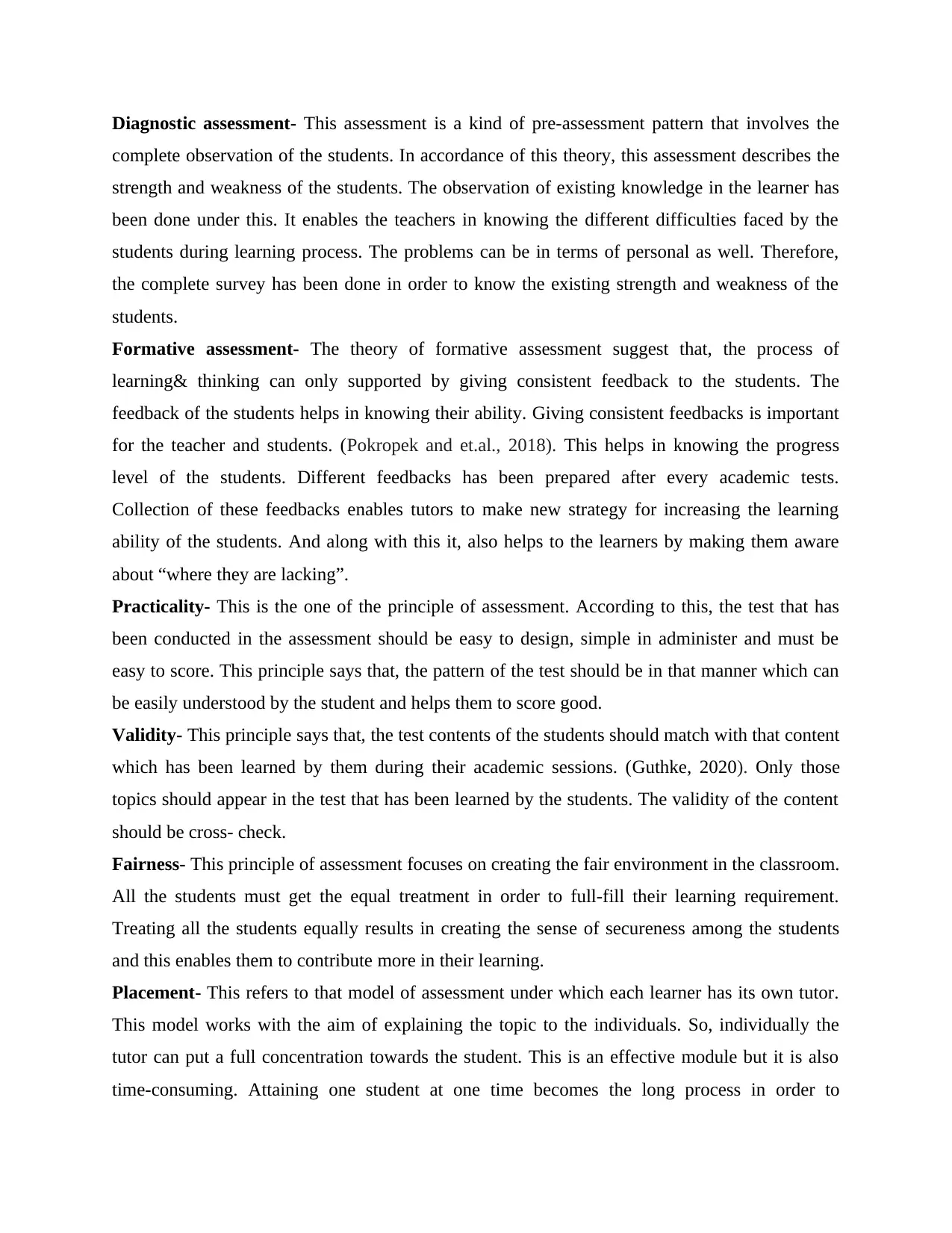
Diagnostic assessment- This assessment is a kind of pre-assessment pattern that involves the
complete observation of the students. In accordance of this theory, this assessment describes the
strength and weakness of the students. The observation of existing knowledge in the learner has
been done under this. It enables the teachers in knowing the different difficulties faced by the
students during learning process. The problems can be in terms of personal as well. Therefore,
the complete survey has been done in order to know the existing strength and weakness of the
students.
Formative assessment- The theory of formative assessment suggest that, the process of
learning& thinking can only supported by giving consistent feedback to the students. The
feedback of the students helps in knowing their ability. Giving consistent feedbacks is important
for the teacher and students. (Pokropek and et.al., 2018). This helps in knowing the progress
level of the students. Different feedbacks has been prepared after every academic tests.
Collection of these feedbacks enables tutors to make new strategy for increasing the learning
ability of the students. And along with this it, also helps to the learners by making them aware
about “where they are lacking”.
Practicality- This is the one of the principle of assessment. According to this, the test that has
been conducted in the assessment should be easy to design, simple in administer and must be
easy to score. This principle says that, the pattern of the test should be in that manner which can
be easily understood by the student and helps them to score good.
Validity- This principle says that, the test contents of the students should match with that content
which has been learned by them during their academic sessions. (Guthke, 2020). Only those
topics should appear in the test that has been learned by the students. The validity of the content
should be cross- check.
Fairness- This principle of assessment focuses on creating the fair environment in the classroom.
All the students must get the equal treatment in order to full-fill their learning requirement.
Treating all the students equally results in creating the sense of secureness among the students
and this enables them to contribute more in their learning.
Placement- This refers to that model of assessment under which each learner has its own tutor.
This model works with the aim of explaining the topic to the individuals. So, individually the
tutor can put a full concentration towards the student. This is an effective module but it is also
time-consuming. Attaining one student at one time becomes the long process in order to
complete observation of the students. In accordance of this theory, this assessment describes the
strength and weakness of the students. The observation of existing knowledge in the learner has
been done under this. It enables the teachers in knowing the different difficulties faced by the
students during learning process. The problems can be in terms of personal as well. Therefore,
the complete survey has been done in order to know the existing strength and weakness of the
students.
Formative assessment- The theory of formative assessment suggest that, the process of
learning& thinking can only supported by giving consistent feedback to the students. The
feedback of the students helps in knowing their ability. Giving consistent feedbacks is important
for the teacher and students. (Pokropek and et.al., 2018). This helps in knowing the progress
level of the students. Different feedbacks has been prepared after every academic tests.
Collection of these feedbacks enables tutors to make new strategy for increasing the learning
ability of the students. And along with this it, also helps to the learners by making them aware
about “where they are lacking”.
Practicality- This is the one of the principle of assessment. According to this, the test that has
been conducted in the assessment should be easy to design, simple in administer and must be
easy to score. This principle says that, the pattern of the test should be in that manner which can
be easily understood by the student and helps them to score good.
Validity- This principle says that, the test contents of the students should match with that content
which has been learned by them during their academic sessions. (Guthke, 2020). Only those
topics should appear in the test that has been learned by the students. The validity of the content
should be cross- check.
Fairness- This principle of assessment focuses on creating the fair environment in the classroom.
All the students must get the equal treatment in order to full-fill their learning requirement.
Treating all the students equally results in creating the sense of secureness among the students
and this enables them to contribute more in their learning.
Placement- This refers to that model of assessment under which each learner has its own tutor.
This model works with the aim of explaining the topic to the individuals. So, individually the
tutor can put a full concentration towards the student. This is an effective module but it is also
time-consuming. Attaining one student at one time becomes the long process in order to
Paraphrase This Document
Need a fresh take? Get an instant paraphrase of this document with our AI Paraphraser
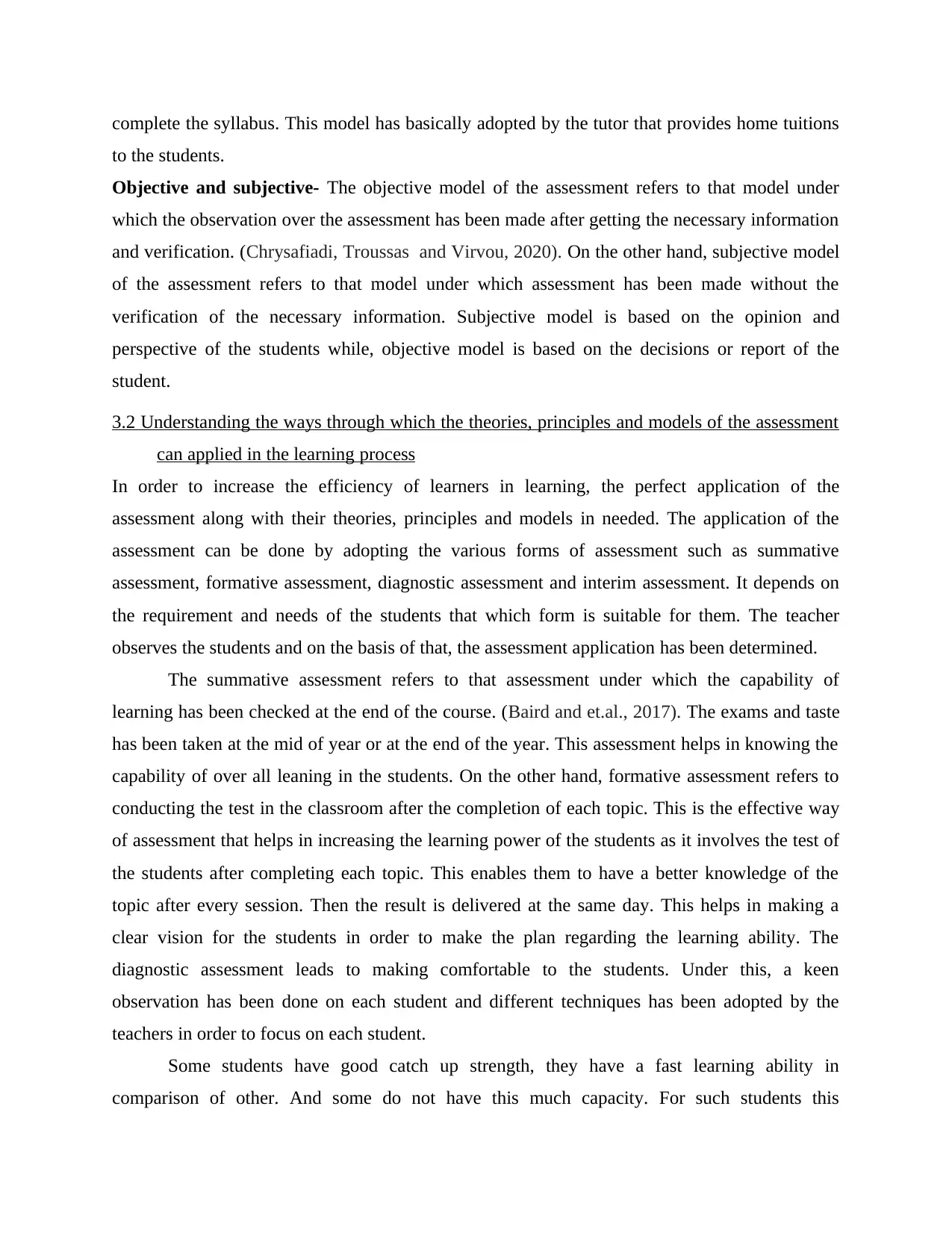
complete the syllabus. This model has basically adopted by the tutor that provides home tuitions
to the students.
Objective and subjective- The objective model of the assessment refers to that model under
which the observation over the assessment has been made after getting the necessary information
and verification. (Chrysafiadi, Troussas and Virvou, 2020). On the other hand, subjective model
of the assessment refers to that model under which assessment has been made without the
verification of the necessary information. Subjective model is based on the opinion and
perspective of the students while, objective model is based on the decisions or report of the
student.
3.2 Understanding the ways through which the theories, principles and models of the assessment
can applied in the learning process
In order to increase the efficiency of learners in learning, the perfect application of the
assessment along with their theories, principles and models in needed. The application of the
assessment can be done by adopting the various forms of assessment such as summative
assessment, formative assessment, diagnostic assessment and interim assessment. It depends on
the requirement and needs of the students that which form is suitable for them. The teacher
observes the students and on the basis of that, the assessment application has been determined.
The summative assessment refers to that assessment under which the capability of
learning has been checked at the end of the course. (Baird and et.al., 2017). The exams and taste
has been taken at the mid of year or at the end of the year. This assessment helps in knowing the
capability of over all leaning in the students. On the other hand, formative assessment refers to
conducting the test in the classroom after the completion of each topic. This is the effective way
of assessment that helps in increasing the learning power of the students as it involves the test of
the students after completing each topic. This enables them to have a better knowledge of the
topic after every session. Then the result is delivered at the same day. This helps in making a
clear vision for the students in order to make the plan regarding the learning ability. The
diagnostic assessment leads to making comfortable to the students. Under this, a keen
observation has been done on each student and different techniques has been adopted by the
teachers in order to focus on each student.
Some students have good catch up strength, they have a fast learning ability in
comparison of other. And some do not have this much capacity. For such students this
to the students.
Objective and subjective- The objective model of the assessment refers to that model under
which the observation over the assessment has been made after getting the necessary information
and verification. (Chrysafiadi, Troussas and Virvou, 2020). On the other hand, subjective model
of the assessment refers to that model under which assessment has been made without the
verification of the necessary information. Subjective model is based on the opinion and
perspective of the students while, objective model is based on the decisions or report of the
student.
3.2 Understanding the ways through which the theories, principles and models of the assessment
can applied in the learning process
In order to increase the efficiency of learners in learning, the perfect application of the
assessment along with their theories, principles and models in needed. The application of the
assessment can be done by adopting the various forms of assessment such as summative
assessment, formative assessment, diagnostic assessment and interim assessment. It depends on
the requirement and needs of the students that which form is suitable for them. The teacher
observes the students and on the basis of that, the assessment application has been determined.
The summative assessment refers to that assessment under which the capability of
learning has been checked at the end of the course. (Baird and et.al., 2017). The exams and taste
has been taken at the mid of year or at the end of the year. This assessment helps in knowing the
capability of over all leaning in the students. On the other hand, formative assessment refers to
conducting the test in the classroom after the completion of each topic. This is the effective way
of assessment that helps in increasing the learning power of the students as it involves the test of
the students after completing each topic. This enables them to have a better knowledge of the
topic after every session. Then the result is delivered at the same day. This helps in making a
clear vision for the students in order to make the plan regarding the learning ability. The
diagnostic assessment leads to making comfortable to the students. Under this, a keen
observation has been done on each student and different techniques has been adopted by the
teachers in order to focus on each student.
Some students have good catch up strength, they have a fast learning ability in
comparison of other. And some do not have this much capacity. For such students this
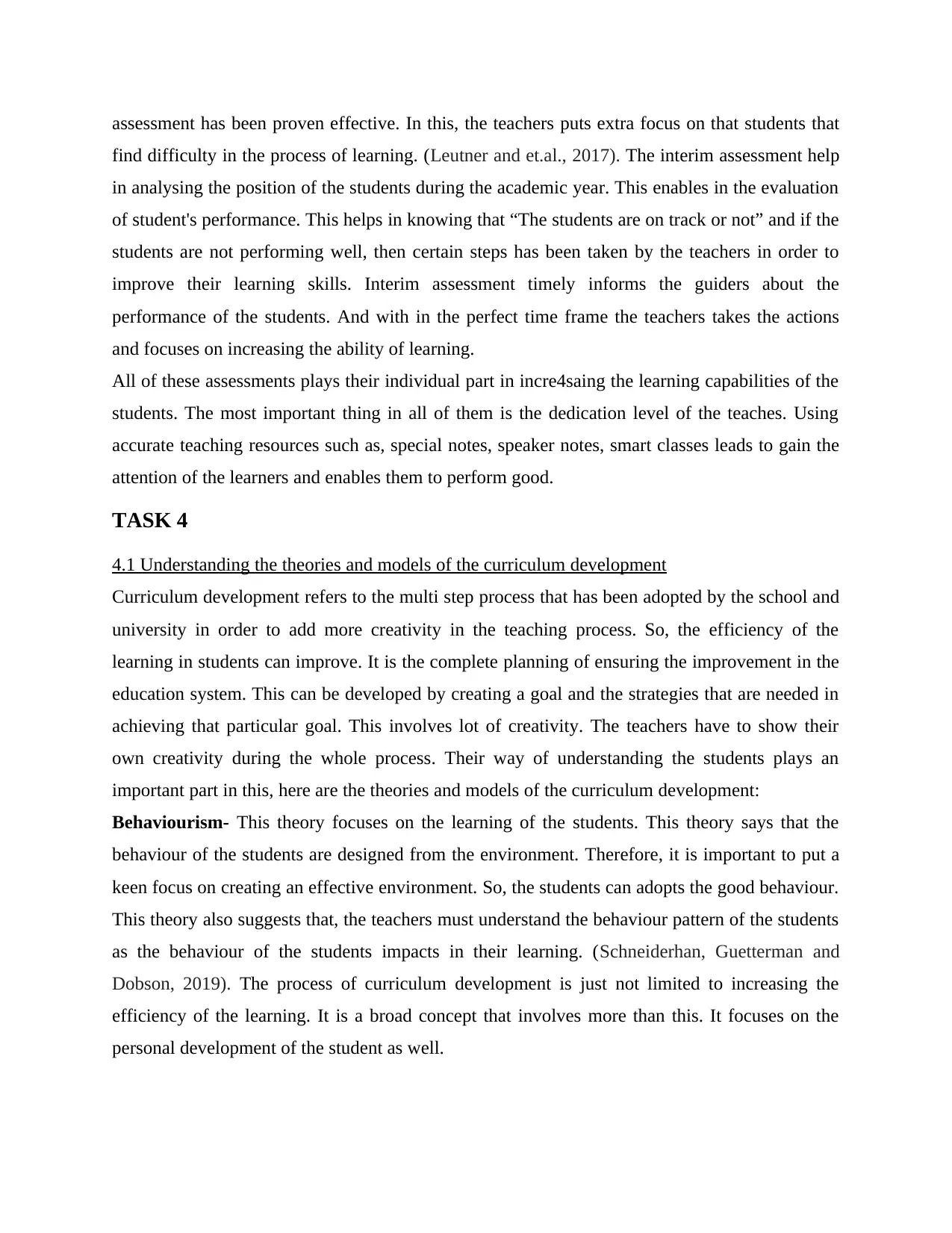
assessment has been proven effective. In this, the teachers puts extra focus on that students that
find difficulty in the process of learning. (Leutner and et.al., 2017). The interim assessment help
in analysing the position of the students during the academic year. This enables in the evaluation
of student's performance. This helps in knowing that “The students are on track or not” and if the
students are not performing well, then certain steps has been taken by the teachers in order to
improve their learning skills. Interim assessment timely informs the guiders about the
performance of the students. And with in the perfect time frame the teachers takes the actions
and focuses on increasing the ability of learning.
All of these assessments plays their individual part in incre4saing the learning capabilities of the
students. The most important thing in all of them is the dedication level of the teaches. Using
accurate teaching resources such as, special notes, speaker notes, smart classes leads to gain the
attention of the learners and enables them to perform good.
TASK 4
4.1 Understanding the theories and models of the curriculum development
Curriculum development refers to the multi step process that has been adopted by the school and
university in order to add more creativity in the teaching process. So, the efficiency of the
learning in students can improve. It is the complete planning of ensuring the improvement in the
education system. This can be developed by creating a goal and the strategies that are needed in
achieving that particular goal. This involves lot of creativity. The teachers have to show their
own creativity during the whole process. Their way of understanding the students plays an
important part in this, here are the theories and models of the curriculum development:
Behaviourism- This theory focuses on the learning of the students. This theory says that the
behaviour of the students are designed from the environment. Therefore, it is important to put a
keen focus on creating an effective environment. So, the students can adopts the good behaviour.
This theory also suggests that, the teachers must understand the behaviour pattern of the students
as the behaviour of the students impacts in their learning. (Schneiderhan, Guetterman and
Dobson, 2019). The process of curriculum development is just not limited to increasing the
efficiency of the learning. It is a broad concept that involves more than this. It focuses on the
personal development of the student as well.
find difficulty in the process of learning. (Leutner and et.al., 2017). The interim assessment help
in analysing the position of the students during the academic year. This enables in the evaluation
of student's performance. This helps in knowing that “The students are on track or not” and if the
students are not performing well, then certain steps has been taken by the teachers in order to
improve their learning skills. Interim assessment timely informs the guiders about the
performance of the students. And with in the perfect time frame the teachers takes the actions
and focuses on increasing the ability of learning.
All of these assessments plays their individual part in incre4saing the learning capabilities of the
students. The most important thing in all of them is the dedication level of the teaches. Using
accurate teaching resources such as, special notes, speaker notes, smart classes leads to gain the
attention of the learners and enables them to perform good.
TASK 4
4.1 Understanding the theories and models of the curriculum development
Curriculum development refers to the multi step process that has been adopted by the school and
university in order to add more creativity in the teaching process. So, the efficiency of the
learning in students can improve. It is the complete planning of ensuring the improvement in the
education system. This can be developed by creating a goal and the strategies that are needed in
achieving that particular goal. This involves lot of creativity. The teachers have to show their
own creativity during the whole process. Their way of understanding the students plays an
important part in this, here are the theories and models of the curriculum development:
Behaviourism- This theory focuses on the learning of the students. This theory says that the
behaviour of the students are designed from the environment. Therefore, it is important to put a
keen focus on creating an effective environment. So, the students can adopts the good behaviour.
This theory also suggests that, the teachers must understand the behaviour pattern of the students
as the behaviour of the students impacts in their learning. (Schneiderhan, Guetterman and
Dobson, 2019). The process of curriculum development is just not limited to increasing the
efficiency of the learning. It is a broad concept that involves more than this. It focuses on the
personal development of the student as well.
⊘ This is a preview!⊘
Do you want full access?
Subscribe today to unlock all pages.

Trusted by 1+ million students worldwide
1 out of 20
Related Documents
Your All-in-One AI-Powered Toolkit for Academic Success.
+13062052269
info@desklib.com
Available 24*7 on WhatsApp / Email
![[object Object]](/_next/static/media/star-bottom.7253800d.svg)
Unlock your academic potential
Copyright © 2020–2026 A2Z Services. All Rights Reserved. Developed and managed by ZUCOL.




